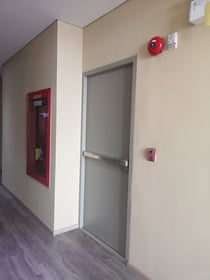Commercial building owners typically have a schedule and routine for maintaining their building’s sprinkler system and fire extinguishers. But fire doors are also very important for containing the damage from a fire and require maintenance to ensure they function properly. Routinely ensuring fire doors are working properly will go a long way toward minimizing building damage as much as possible during a fire. Building owners and property managers should add these doors to their routine maintenance checklists. 
Building protection from fire doors
Fire doors are designed to close automatically, by being connected to another warning system or when smoke or fire is detected in the area. Fire doors are also stronger than regular doors and can withstand the heat from a fire for 20 to 180 minutes. This can buy precious time for occupants of the building to escape and for suppression of the fire to start so that damage can be contained. But if these doors don’t function as intended, they offer no additional building protection.
Common fire door issues
- Missing or broken components: Fire doors must be able to latch securely on their own to prevent the spread of smoke and fire. If broken hardware prevents the door from closing/latching securely then it won’t function as intended.
- Propped open or blocked fire doors: Fire doors shouldn’t be blocked; if there’s something in the way when the release mechanism tries to close the door, it’ll get stuck open and again do nothing to protect occupants or the building.
- Unapproved hardware: Nothing should be added to fire doors, such as kick-down door stops.
The National Fire Protection Association (NFPA) code requires annual inspections of all fire doors in your building. Read through our Safety Summary with this information and more on what the NFPA requires for buildings with fire doors. These doors are important to saving lives and minimizing property damage from a fire, so building owners should make sure they’re functioning properly.





